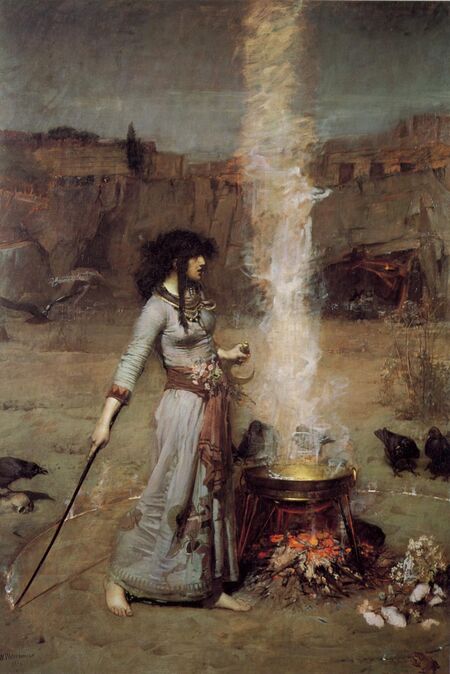“Sorcerer” is derived from a Latin word, which means a person who does divination by the casting of lots (something which is illegal in Judaic and Christian society). It has mostly come to mean someone who can manipulate fate through supernatural means as well as divine. “Sors” meant fate and over time it was not just someone who divined fate, but also bound the ties of fate. While it did have negative and unchristian associations, it was not as demonized as the term witch. It is an older word and it was commonly employed when translating foreign texts such as Arabian Nights which might not have the same negative association with the magic practitioner. Cerce is translated as a “sorceress”.
In the 19th century Eliphas Levi, uses the term sorcerer to deride Heinrich Cornelius Agrippa as a form of insult. His use of the term suggests for Levi it means “satanic” magic practitioner. He also refers to the Witch’s Sabbath as the Sabbath of Sorcerers. He felt that sorcerers reduce magic to profanity. They pervert the human will, they create illusions and poisons. He associated them with what he called “nigromancers” (black magic practitioners). He compared them to Magicians, who he felt worked with the divine power of God and suggested that sorcerers had no real power to work with since the devil “did not exist”. He saw the devil as the opposite of god, so while god was existing and powerful, the devil was non-existing and powerless. In his view, the sorcerer left the ritual circle open to demons whereas the magician closed it off to protect himself. A magician puts his triangle, the space where spirits would manifest, outside the circle, so it was separated from him, whereas the sorcerer put it inside the circle where the demons summoned would have access to his body. Note this access to the body, which was seen in the description of witches.
Another definition of sorcerer appears in D&D, but has influence over how people perceive the meaning of the term. In D&D while wizards are there as those that have magical power due to knowledge, sorcerers have it due to heritage and charm, they are often descended from a race having dragon blood in their veins or some other reason for having magic in the family as a natural part of their body. Talk about entitled! Sometimes a part of their body is deformed and appears draconic or demonic, because of their magical heritage connects their body to a magical reality or draconic heritage, in a similar way to Eliphas Levi’s idea of sorcery allowing the demons closeness and access to the sorcerer’s body. Both witches and sorcerers have their very bodies connected to the spiritual world they work with and embody the forces they work with, but magicians are cleanly divided away from what they might be summoning.
Due to the lack of popular use Jason Miller has chosen to revive the term “sorcerer” with his extremely popular series “Strategic Sorcery”. He suggests that a sorcerer is a person who uses magic to obtain goals. They attack their problems both physically and spiritually with a two-pronged attack that reflects a better strategy than either simply bewitching and doing nothing physical or going about physical actions without making use of spiritual powers. Like me, he felt that witch was too feminine, nocturnal, lunar and nature-based and ceremonialist was too masculine, journal, solar and temple-based. A better practice is found somewhere between them. Primarily however, his focus was thaumaturgy (or wonderworking) where spirituality is used for results in the physical world and he has little focus on theurgy (god-working) or mystical ascent which he felt other books covered in abundance. Because of this, some people have come to associate the Jason Miller sorcerers and sorceresses with a distinct lack of Theurgy or mysticism something he is trying to rectify with his recent course on Hekate, but his recent work is mostly going unnoticed by the people I know.

See also Goetia (Greek sorcery).
See also other types of Magical Practitioner.

Comments
One response to “What is a Sorcerer?”
[…] Sorcerer / Sorceress […]